Created to Love
God spun the sinews of creation. From the beginning, our Creator modeled six days of activity followed by rest. In turn, we are called from the long stretches of our busy labor into holy sabbath. We pause in order to take in the joy and weight of being formed in love, as the hope of creation.
Let us gather in the next seven weeks to draw in God’s sustaining breath. Come
To guide us into the weeks ahead, you will find the following materials for individual or group reflections, Scripture readings with sermonic excerpts from Bishop LaTrelle Miller Easterling, Social Principles of The United Methodist Church, quotes from our Wesleyan heritage, thematic songs, and centering prayers.
May this sacred time be one of spiritual renewal. God is with you. God is with us. God is just and God is merciful. Let us be just and merciful with one another as Christ’ servants of love.
Thanks
Before You Begin
Group Study Instructions
As a way to create a brave and safe space for faithful dialogue, please consider using the RESPECTful Communication Guidelines and the process of Mutual Invitation. These guidelines are written in a way for you to share with your group. If your group is larger than seven people, consider breaking people into smaller groups and provide time for sharing.
RESPECTful Communication Guidelines
R = take RESPONSIBILITY for what you say and feel without blaming others.
E = use EMPATHETIC listening.
S = be SENSITIVE to differences in communication styles.
P = PONDER what you hear and feel before you speak.
E = EXAMINE your own assumptions and perceptions.
C = keep CONFIDENTIALITY.
T = TRUST ambiguity because we are not here to debate who is right or wrong.
Mutual Invitation
In order to ensure that everyone who wants to share has the opportunity to speak, we will proceed in the following way: The leader or a designated person will share first. After that person has spoken, he or she then invites another to share.
Whom you invite does not need to be the person next to you. [As a matter of
If you are not ready to share yet, say “I pass for now” and you will be invited to share later on. If you don’t want to say anything at all, simply say “pass” and proceed to invite another to share. We will do this until everyone has been invited.
We invite you to listen and not to respond to someone’s sharing immediately (also known as crosstalk). There will be time to respond and to ask clarification questions after everyone has had an opportunity to share.
*taken from The Wolf Shall Dance With the Lamb by Eric Law
Consider ending each group time with the use of the Companion Litany to the Our Social Creed
God in the Spirit revealed in Jesus Christ,
calls us by grace
to be renewed in the image of our Creator,
that we may be
Today is the day
God cares for the integrity of creation,
weeps at the plunder of earth’s goodness.
And so shall we.
Today is the day
God embraces all hues of humanity,
delights in diversity and difference,
favors solidarity transforming strangers into friends.
And so shall we.
Today is the day
God cries with the masses of starving people,
despises growing disparity between rich and poor,
demands justice for workers in the marketplace.
And so shall we.
Today is the day
God deplores violence in our homes and streets,
rebukes the world’s warring madness,
humbles the powerful and lifts up the lowly.
And so shall we.
Today is the day
God calls for nations and peoples to live in peace,
celebrates where justice and mercy embrace,
exults when the wolf grazes with the lamb.
And so shall we.
Today is the day
God brings good news to the poor,
proclaims release to the captives,
gives sight to the blind, and
sets the oppressed free.
And so shall we.
~2016 Book of Discipline, Social Principles ¶166
Week 1: How Am I Created to Love?
IN WORD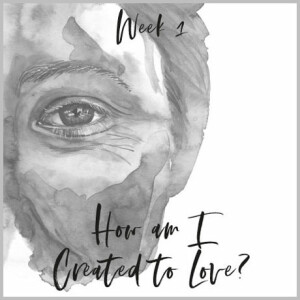
Genesis 1:26-27, Luke 10:25-37, 2 Corinthians 5:16-21
IN GOD'S IMAGE
"Each book of the Bible, each chapter of the telling of God’s unfolding story for creation, evidences God’s desire for blessing, abundance, sharing, community,
“We must always be humble, selfless, and reverent enough to prostrate ourselves before God and ask, 'God, is my heart pure? Where do I need to continue being transformed? Where do my beliefs, my actions, and my allegiances fall short of your prescribed precepts? Where does my life not bring you glory? Where am I still consumed with self?' And when we ask, we need to be silent long enough to hear the answer. And do the work necessary to change.
“As we listen and work, we must remember that all of us – each one of us – were created in the imago
- Bishop LaTrelle Miller Easterling
ON PRINCIPLE
“We, the people called United Methodists, affirm our faith in God our Creator and Father, in Jesus Christ our Savior, and in the Holy Spirit, our Guide
"We acknowledge our complete dependence upon God in birth, in life, in death, and in life eternal. Secure in God’s love, we affirm the goodness of life and confess our many sins against God’s will for us as we find it in Jesus Christ. We have not always been faithful stewards of all that has been committed to us by God the Creator. We have been reluctant followers of Jesus Christ in his mission to bring all persons into a community of love. Though called by the Holy Spirit to become new creatures in Christ, we have resisted the further call to become the people of God in our dealings with each other and the earth on which we live.
“We affirm our unity in Jesus Christ while acknowledging differences in applying our faith in different cultural contexts as we live out the gospel. We stand united in declaring our faith that God's grace is available to all, that nothing can separate us from the love of God in Christ Jesus.
“Grateful for God’s forgiving love, in which we live and by which we are judged, and affirming our belief in the inestimable worth of each individual, we renew our commitment to become faithful witnesses to the gospel, not alone to the ends of the earth, but also to the depths of our common life and work.”
- 2016 Book of Discipline, Social Principles/Preamble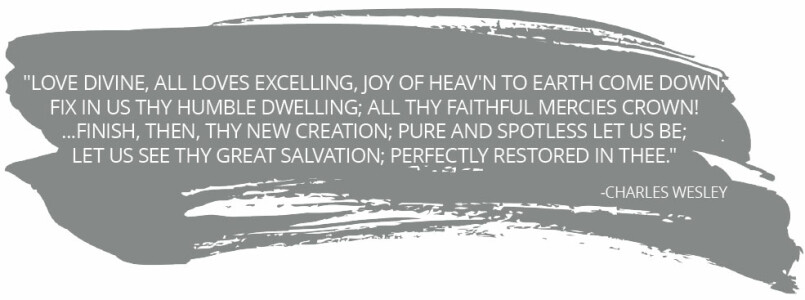
IN SONG
Give Me A Clean Heart, TFWS #2133
Change Me, O God by Tamela Mann
Child of God by Mark Miller
Amar, Mil Voces Para Celebrar (MVPC, Spanish) # 286
IN REFLECTION AND ACTION
- Reflect upon this week’s readings and question: “How am I created to love?” What thoughts come to mind as you consider this question? What doubts are raised for you? What insights are affirmed?
- The story of God at work in the world throughout
history points to a divine passion for equality and justice. How do issues of equality and justice show up in your life and faith journey? Noting that we are masterfully created with a beautiful tapestry of cultures, how have issues of equality and justice shown up in the life and faith journey of others? Howdoes this perspective-taking shift your understanding of justice and the real work required toward equality? - Go Deeper: CREATE
"Taking an active stance in society is nothing new for followers of John Wesley. He set the example for us to combine personal and social piety. Ever since predecessor churches to United Methodism flourished in the United States, we have been known as a denomination involved with people's lives, with political and social struggles, having local to international mission implications. Such involvement is an expression of the personal change we experience in our baptism and conversion.
“The United Methodist Church believes God's love for the world is an active and engaged love, a love seeking justice and liberty. We cannot just be observers. So we care enough about people's lives to risk interpreting God's love, to take a stand, to call each of us into a response, no matter how controversial or complex. The church helps us think and act out a faith perspective, not just responding to all the other 'mind-makers-up' that exist in our society."
Using words or images, create a representation of how you are created to have an active and engaged love in the image of God. Share yours with us directly at or on social media using #CreatedtoLoveUMC.
IN PRAYER
God, Give me a clean heart that I might serve you.
Give me a transformed mindset that I might witness for you.
Give me the courage to own my whole story and to join it with yours
Because you created me to love as Christ loves,
So that
Week 2: Where am I Overly Concerned with Self?
IN WORD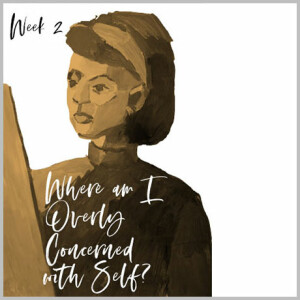
GOD CREATES US FOR COMMUNITY
“At the genesis of creation, our Creator had a vision for the cosmos. Our Creator breathed into existence a symbiotic unity of harmony birthed in a divine crucible of humility, justice, and shalom. And our Creator realized that it was not good for there to be singularity; therefore, God created community. Those communal beings were given the responsibility to cultivate, nurture, and increase the blessings God bestowed upon the earth. They dwelt in complete purity without shame. They dwelt in simplicity without competition. They dwelt in a covenant of trust and cooperation. And it was good
“It was more than enough until egotism destroyed the equilibrium of creation. That egotism — the habit of valuing everything only in reference to one’s personal interest, selfishness,
“From the time of the
- Bishop LaTrelle Miller Easterling
ON PRINCIPLE
“The community provides the potential for nurturing human beings into the fullness of their humanity… Primary for us is the gospel understanding that all persons are important — because they are human beings created by God and loved through and by Jesus Christ and not because they have merited significance. We, therefore, support social climates in which human communities are maintained and strengthened for the sake of all persons and their growth. We also encourage all individuals to be sensitive to others by using appropriate language when referring to all persons.
- 2016 Book of Discipline, Social Principles/The Nurturing Community ¶161
IN SONG
Holy, Holy, Holy! Lord God Almighty, UMH #64
Santo! Santo! Santo!, UMH #65
Grace Alone, TFWS #2162
I Shall Not Want, Audrey Assad
IN REFLECTION AND ACTION
- How much of your energy is spent on what has happened to you or should have happened to you so that you are validated/feel good about yourself? How much of your energy is spent on what God is calling you to do to make a positive difference in the world?
- The Creation story in Genesis tells us that God created us to live in
community . What role does community play in your life? What role would you likeit to play? - Go Deeper: INVENTORY
“...Egotism destroyed the equilibrium of creation. That egotism —the habit of valuing everything only in reference to one’s personal interest, selfishness,and self-centeredness, the view that morality ultimately rests on self-interest — that egotism, has caused humanity to fracture and accept a narrative antithetical to the very nature of our Creator. It creates the false reality that there is any separation among us.” - As a way to becoming restored to God’s original equilibrium of creation, inventory your habits:
-
List the things you do or think that stem from your ego or “false self.”
-
List the communities or people groups with whom you feel disconnected.
-
Take the Implicit Bias Association Test and reflect on language and/or stances you take that contribute to creating a false hierarchy of human value. Use the workbook, webinar, or process with your small group, friends, or leadership team.
-
What might you do to address these things in order to promote healing, build
healthier community, and restore creation everywhere you go?
IN PRAYER
God, Give me a clean heart that I might serve you.
Give me a transformed mindset that I might witness for you.
Give me the courage to own my whole story and to join it with yours.
Because you created me to love as Christ loves,
So that
Week 3: Is My Heart Pure?
IN WORD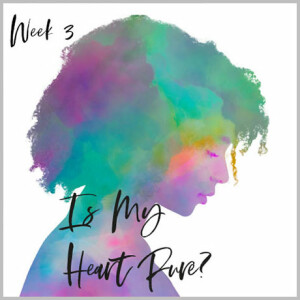
Psalm 24:3-4; Micah 6:6-8; Matthew 5:8; Romans 10:8b-13
WITH HUMBLE HEARTS
“As those coming to make amends with God asked what sacrifice was suitable for honoring and worshipping the God of all creation, the prophet Micah spoke a timeless truth, an unadulterated truth, an unequivocal truth, that speaks to the purest nature of God: God does not want our external offerings and hollow observances devoid of true meaning and suspect intent. God does not seek our gathering of things, consumer-driven material goods, to superficially assuage our guilt and placate our sin.
“God says, ‘Don’t bring me fattened calves, I made the calf. Don’t bring me a thousand rams, I made the rams and the hills upon which they graze. Don’t bring me doves in droves, I made the doves and air that enables their flight. Bring me your reconciled heart. Yes, I made that too, but I gave you the free will to choose between right and wrong, good and evil, worshipping evil or worshipping me — bring me your humble heart and made up mind to serve me and love your neighbor.’
“Beloved, God is not fooled and God will not be mocked by insincere lip service to repentance and change. Rather, God desires an offering of the heart; an outward expression of an internal transformation to do justice, love mercy, and walk humbly with our God. God desires action, the doing and not just the uttering. God desires our righteous conduct. God desires that we live our faith and activate our spirituality for the common good. God desires a humble heart that lives for others and not self. God desires a turning away from destructive thinking, ignoble intent, and disingenuous holiness.”
- Bishop LaTrelle Miller Easterling
ON PRINCIPLE
“We see God’s grace and human activity working together in the relationship of faith and good works. God’s grace calls forth human response and discipline. Faith is the only response essential for salvation. However, the General Rules remind us that salvation evidences itself in good works. For Wesley, even repentance should be accompanied by ‘fruits meet for repentance,’ or works of piety and mercy. Both faith and good works belong within an all-encompassing theology of
“We insist that personal salvation always involves Christian mission and service to the world. By joining heart and hand, we assert that personal religion, evangelical witness, and Christian social action are reciprocal and mutually reinforcing. Scriptural holiness entails more than personal piety; love of God is always linked with love of neighbor, a passion for justice and renewal in the life of the world.
“The General Rules represent one traditional expression of the intrinsic relationship between Christian life and thought as understood within the Wesleyan tradition. Theology is the servant of piety, which in turn is the ground of social conscience and the impetus for social action and global interaction, always in the empowering context of the reign of God.”
- 2016 Book of Discipline ¶ 102, Our Doctrinal Heritage: Faith and Good Works and Mission and Service p. 54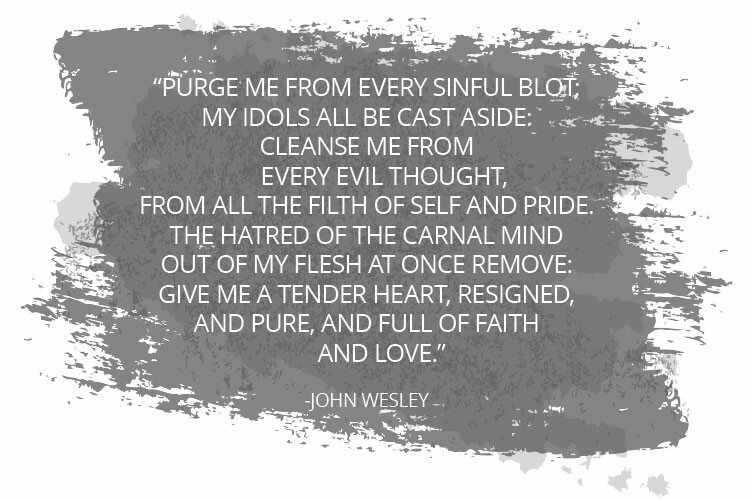
IN SONG
Change My Heart, O God, TFWS #2152
Pure Heart by Hillsong (cover)
Salvador, a
A Heart That Forgives by Kevin LaVar
IN REFLECTION AND ACTION
- What
in your own heart keeps you from experiencing the fullness of God and for living as God created you? Using the fruits of the Spirit as your guide, reflect on where your heart is pure and where repentance is necessary.
“But the fruit of the Spirit is love, joy, peace, forbearance, kindness, goodness, faithfulness, gentleness,and self-control. Against suchthings there is no law. Those who belong to Christ Jesus have crucified the flesh with its passions and desires. Since we live by the Spirit, let us keep in step with the Spirit. Let us not become conceited, provoking, and envying each other.” Galatians 5:22-26 - Repentance is sometimes defined as “an outward expression of an internal transformation.” What role does repentance play in your life?
- Go Deeper: REPENT — Set aside a quiet moment for yourself and design an informal ritual or say a prayer that allows you to offer your heart to God.
IN PRAYER
God, Give me a clean heart that I might serve you.
Give me a transformed mindset that I might witness for you.
Give me the courage to own my whole story and to join it with yours
Because you created me to love as Christ loves,
So that
Week 4: How are My Actions Aligned with God’s Will?
IN WORD
Isaiah 55:1-9; 1 John 4: 8-20; 1 John 4:7-21; Galatians 3:26-29
RECLAIMING AUTHENTIC VOICES
“We, as a society, like to call upon the names of and extol the work of great leaders such as Martin Luther King, Jr., Mohandas Gandhi, Mother Teresa, and Oscar Romero. When we call their names, we speak in soaring rhetoric about the justice they worked for, marched for, prayed for, sacrificed for, and died for; because they are dead and, in death, they no longer pose a threat.
“They were not heralded and honored in life when they called for equality, when they called for a dismantling of systemic oppression and exclusion, when they called this nation to account for her unfulfilled promises of liberty and justice for all birthed in the womb of a new republic and aborted on the altar of supremacy and superiority. We cannot call upon those names and claim to revere them when they stood for justice and too many in this country now stand for injustice. Each of these individuals served a God they knew demanded humility and equality and justice. What does the Lord require of us? With our lips we proclaim obedience, but with our
“When anyone believes themselves to be superior to others, they betray God. When anyone believes themselves born into a privileged class or peoples, they betray God. When anyone believes the color of their skin means God favors them over the
“When anyone bastardizes the Word of God for selfish gain and affinity affirmation, they betray God. When anyone passively benefits from racist and discriminatory policies, practices, and programs, they betray God. When anyone silently witnesses the mistreatment of others created in the image and likeness of God based on racist, sexist, xenophobic, and other categories of designed difference, they betray God. When anyone espouses hateful rhetoric and violent rampage, they betray God. There is no race except the human race.
“Dr. King preached that, ‘as long as the mind is enslaved, the body can never be free.’ … This is a journey we must take together if we are to reclaim our authentic voice for activism and to become the Beloved Community.
“Until we believe that all people have inherent worth and dignity, we will be mere wayfarers on the road. Our theological minds must be free from the notion that one’s proclivity determines one's preciousness before God. We are all heterosexual, homosexual, bisexual, transgender, and queer — loved by God and beloved of God. We are all Native-American and African-American, European-American, Hispanic-American,
- Bishop LaTrelle Miller Easterling
ON PRINCIPLE
“Racism is the combination of the power to dominate by one race over other races and a value system that assumes that the dominant race is innately superior to the others. Racism includes both personal and institutional racism. Personal racism is manifested through the individual expressions, attitudes, and/or behaviors that accept the assumptions of a racist value system and that maintain the benefits of this system. Institutional racism is the established social pattern that supports implicitly or explicitly the racist value system. Racism, manifested as sin, plagues and hinders our relationship with Christ, inasmuch as it is antithetical to the gospel itself. In many
“Therefore, we recognize racism as sin and affirm the ultimate and temporal worth of all persons. We rejoice in the gifts that particular ethnic histories and cultures bring to our total life. We commit as the Church to move beyond symbolic expressions and representative models that do not challenge unjust systems of power and access.
“We commend and encourage the self-awareness of all racial and ethnic groups and oppressed people that leads them to demand their just and equal rights as members of society. We assert the obligation of society and people within the society to implement compensatory programs that redress long-standing, systemic social deprivation of racial and ethnic persons. We further assert the right of historically underrepresented racial and ethnic persons to equal and equitable opportunities in employment and promotion; to education and training of the highest quality; to nondiscrimination in voting, access to public accommodations, and housing purchase or rental; to credit, financial loans, venture capital, and insurance policies; to positions of leadership and power in all elements of our life together; and to full participation in the Church and society. We support affirmative action as one method of addressing the inequalities and discriminatory practices within the Church and society.”
- 2016 Book of Discipline, Social Principles/The Social Community ¶162
IN SONG
We are One in the Spirit
Help Us Accept Each Other, UMH #560
One by Nicole C. Mullen
Somos
IN REFLECTION AND ACTION
- Consider opening your reflection time with the Lord’s Prayer. (in Korean, Spanish,
and Hebrew) - Ponder how you believe your life is, and is not, aligned to the will of God. What one or two steps might you take to be more in step with God’s plans for your life?
- Consider the many things in our country, and our church, that
unite and divide us. What divisions are most difficult for you? Why? What does your faith have to say about these divisions? - Go Deeper: LEARN — Throughout history, many people have stood out as prophets and leaders for justice. Choose someone whose witness challenges you and learn more about their life story.
IN PRAYER
God, Give me a clean heart that I might serve you.
Give me a mindset that I might witness for you.
Give me the courage to own my whole story and to join it with yours
Because you created me to love as Christ loves,
So that
Week 5: Where does my life not bring God glory?
IN WORD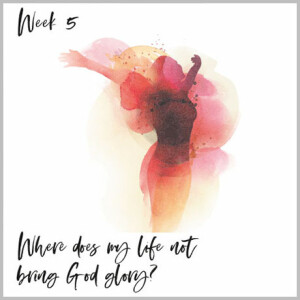
Psalm 8, 1 Kings 19:11-13, Psalm 139:23-24 and Philippians 3:12-14
THROUGH THE EYES OF CHRIST
“As we introspectively analyze our hearts, souls,
“We can relinquish who we were, we can relinquish our lesser ideals, we can relinquish our destructive thoughts and practices, we can relinquish our selfish silence, we can relinquish our apathy, we can relinquish our bitterness and move higher.
“Viewing each other through the eyes of Christ and remaining at the table during the hard and difficult discussions is the only way, the only path, to new and genuine relationships and partnerships for the journey ahead. There was a time when the prophetic church understood itself as both soul-saver and chain-breaker, as salvific agent and status-quo agitator. There was a period when men and women set their faces toward freedom and refused to look back.
“But unfortunately, all too often, in our present milieu and malaise, that prophetic voice has become apathetic. Cries for freedom have, too often, become cries for assimilation, acceptance,
- Bishop LaTrelle Miller Easterling
ON PRINCIPLE
The rights and privileges a society bestows upon or withholds from those who comprise it indicate the relative esteem in which that society holds particular persons and groups of persons. We affirm all persons as equally valuable in the sight of God. We, therefore, work toward societies in which each person’s value is recognized, maintained, and strengthened. We support the basic rights of all persons to equal access to housing, education, communication, employment, medical care, legal redress for grievances, and physical protection. We deplore acts of hate or violence against groups or persons based on race, color, national origin, ethnicity, age, gender, disability, status, economic condition, sexual orientation, gender identity, or religious affiliation. Our respect for the inherent dignity of all persons leads us to call for the recognition, protection, and implementation of the principles of The Universal Declaration of Human Rights so that communities and individuals may claim and enjoy their universal, indivisible, and inalienable rights.
- 2016 Book of Discipline, Social Principles/The Social Community ¶162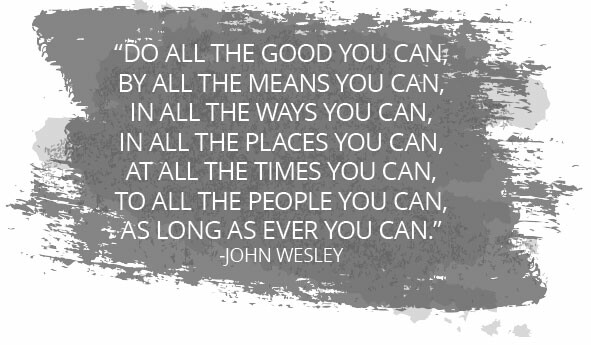
IN SONG
To God Be the Glory, UMH #98
My Tribute, UMH #99
Great is Thy Faithfulness
Great Are You, Lord, by All Sons and Daughters
IN REFLECTION AND ACTION
- How do we, in the words of Bishop Easterling, “relinquish our bitterness and move higher”?
- “To God be the glory” is more than a turn of phrase. Listen to that still small voice within you. In what ways do you bring glory to God? In what ways might your behavior need to change?
- Sometimes we shrink from offering a prophetic voice. Is there an area in your life or community in which you need to speak out about? Where is God nudging you to speak, act and move?
- Go Deeper: DREAM — Freedom is a dramatic and expansive idea. How would you define God’s vision of freedom for all people? What will it take for us to arrive on freedom’s shores?
IN PRAYER
God: Give me a clean heart that I might serve you.
Give me a transformed mindset that I might witness for you.
Give me the courage to own my whole story and to join it with yours
Because you created me to love as Christ loves,
So that
Week 6: Where Do We Need to Be Transformed?
IN WORD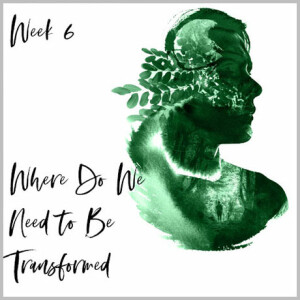
Luke 6:27-36; Ephesians 4:29-32; Romans 12:1-3
RECLAIM THE JOURNEY
“Those who have worked toward supremacy can be like Ken Parker, a former Grand Dragon for the KKK, who began to question why he hated Black and Brown people and slowly walked away from that lifestyle, now fully renouncing the KKK, its message of hate and supremacy, and working to transform others.
“Or like Arno
“Hate kills, hate destroys, hate violates, hate controls, hate dominates, hate silences, hate terrorizes, hate legislates inequality, hate hides behind religion and politics to promote oppression and inequality. Hate imprisons those who hate more than those they wish to oppress. Hate is not of God!
“The church of Jesus Christ has been
“But this isn't just the journey of those who yearn for freedom. It's the journey of those who must get their feet off the necks of those who yearn for freedom. This is all of our journeys together, and in order to reclaim recall and reinvigorate, we must first remember.”
- Bishop LaTrelle Miller Easterling
ON PRINCIPLE
"The person who doesn't love doesn't know God, because God is love. . . . If anyone says, ‘I love God, and hates a brother or sister who can be seen can't love God, who can't be seen.’ (1 John 4:8, 20)
“The United Methodist Church reaffirms its historical commitment opposing acts of hate, hate speech, and violence in both church and society. The church commits itself to redouble its efforts to speak out against hate crimes and work to transform the context of fear and hate that gives permission to these acts, naming and challenging the culture that perpetuates it.
“Be it resolved, that The United Methodist Church, with assistance from the appropriate boards, agencies, and local churches, implement the following recommendations:
“Faith and Biblical Resources:
- provide biblically-based resources for young people and adults that address the historic and systemic roots of hate that lead to hate speech and hate crimes;
- create resources to help United Methodists analyze the language of hate among groups that use religious language to justify hatred and bigotry;
- work with ecumenical and interfaith groups to create worship resources, and develop community activities to unite religious groups on behalf of justice for all;
- Educational Resources: develop educational materials to build an
understanding of the systemic, institutionalized culture of racism, sexism, homophobia, and other forms of marginalization;
- develop materials to explore and challenge expressions of hate,
including: personal attitudes, scapegoating, individual violence, media distortions to public policy, and collective violence, including state violence;
- educate United Methodists about trends of hate in the US and the world and how the church can prevent and respond to acts of hate;
“Action/Organizing/Advocacy:
- encourage United Methodists to report hate incidents to the police, and to organize support for victims of hate crimes;
- encourage United Methodists to end complicity with hate by speaking out when jokes, disparagements, and stereotypes are based on identity or status;
- Annual Conferences-Responding to Hate Crimes:
- annual conferences develop databases of information of local and state hate groups and explore the connections between anti-immigrant/refugee groups and white supremacist organizations in order to develop strategies for a
response for use by local churches; - organize letter-writing campaigns and denominational and ecumenical delegations to meet with state government officials to advocate for the passage, funding, and implementation of strong and comprehensive state hate crimes laws that extend civil rights protections to all individuals and groups;
- encourage law-enforcement personnel to maintain records on hate crimes and to bring to justice the perpetrators of such violence and intimidation;
- strongly encourage local churches, annual conferences, general agencies, campus ministry units, and any other place where The United Methodist Church has a witness, to create opportunities to hear from excluded groups about the reality and impact of hate and to partner with them to act for justice;
- be active participants in civic or religious organizations that promote unity and diversity and work to eradicate acts of hate, as well as working with diverse grassroots and national organizations;
- engage in efforts to enable communities to unearth the truth about past hate violence, to bring perpetrators (including state actors) to trial, and to heal wounds and seek reconciliation based on justice and more equitable power relationships. This effort is based on the South African Truth and Reconciliation Commission and other efforts now linked through the Center for Transitional Justice;
- work through local organizations and local schools to ensure their policies and training programs adequately address various forms of discrimination and sexual harassment based on gender and perceived sexual identity;
- use United Nations and other resources for adults and children in efforts to build a global culture of peace;
- create an annual conference task force to develop strategies to address actions of the media that use or condone hate speech, stereotypes, or racial profiling.”
- annual conferences develop databases of information of local and state hate groups and explore the connections between anti-immigrant/refugee groups and white supremacist organizations in order to develop strategies for a
- 2016 Book of Resolutions -- Social Principles ¶3422/Transforming the Context of Hate in the United States. Social Principles ¶162A, H, J.
IN SONG
Lord, Whose Love Through Humble Service, UMH #581
Here I Am, Lord, UMH #593
I Belong to You by William McDowell
You Say by Lauren Daigle
IN REFLECTION AND ACTION
- Consider the question, “Where do we need to be transformed?” Think about the community or congregation to which you most relate. How might they answer this question? What are some of the first steps that might be required for that transformation?
- Hate is a powerful emotion. When in your life have you experienced hatred? When is an instance where you might have hated something or someone?
- Go Deeper: REMEMBER — "Since the earliest times, the vows of Christian baptism have consisted first of the renunciation of all that is evil and then the profession of faith and loyalty to Christ. Parents or other sponsors reaffirm these vows for themselves while taking the responsibilities of sponsorship. Candidates for confirmation profess for themselves the solemn vows that were made at their baptism.”
Remember your baptismal vows:
“On behalf of the whole Church, I ask you:
Do you renounce the spiritual forces of wickedness,
reject the evil powers of this world, and
repent of your sin?
Do you accept the freedom and power God gives you
to resist evil, injustice, and oppression
in whatever forms they present themselves?
Do you confess Jesus Christ as your Savior,
put your whole trust in his grace,
and promise to serve him as your Lord,
in union with the Church which Christ has opened
to people of all ages, nations, and races?
What do these vows mean to you today?
IN PRAYER
God: Give me a clean heart that I might serve you.
Give me a transformed mindset that I might witness for you.
Give me the courage to own my whole story and to join it with yours
Because you created me to love as Christ loves,
So that
Week 7: How are We United to Love?
IN WORD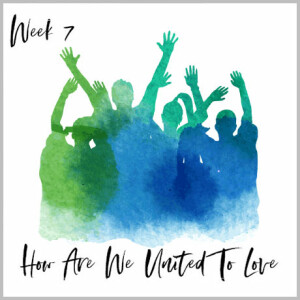
Psalm 63:1-8; Philippians 2:5-11; Matthew 22: 36-40
LIVE OUT LOUD
“At the height of his career, Howard Thurman took a bold step and co-created the first fully integrated multicultural Christian community in America. Even today, 11 a.m. on Sunday morning is still the most segregated hour in America. But Dr. Thurman, a visionary mystic, had the courage of his convictions and believed that the church of God should not be divided
“Beloved, right now, the church is too silent. There is no limit to the power that may be released through you. Our voices can tear down the walls that divide us. It must be reclaimed. We have a duty to return the church of Jesus Christ to her suitable condition for preaching the real Good News of Jesus Christ. We have the profound, unmitigated marching orders to bring her back from the era of pulpit pimps and decked out divas, more concerned with fame than faith. We have to protect the church from the waste of majoring in the minors and minoring in the majors and secure her for the journey ahead.
“Gird your loins, O Church of God. As long as children are being shot in the street or traded as sex slaves, as long as justice in our legal system is not blind, as long as the planet is being destroyed by misuse and abuse, as long as disease still ravages whole continents, as long as living wages are withheld from workers, as long as women are pawns in the political system, as long as we can cage children and unwelcome the stranger, the call for activism must still go out.
“Unless all are free, none are free. We have to recall and reclaim our voice for freedom. We have to recall and reclaim this cry for justice; we have to recall and reclaim our rightful place at the forefront of the fight for equality. … Then, and only then, will we be able to proclaim, ‘Free and last free at last, thank God Almighty we're all free at last!’
“There is not a single mainstream religious tradition founded on the notion of racial superiority, domination, or hate. Those notions and practices are antithetical to every higher power called upon in the name of holiness. Make no mistake, there are extremists within every religious body who misinterpret, misrepresent, and misuse the sacred writ of their peoples to support their own divisive and selfish ends. And, there have also been wars waged by religious zealots intent on imposing their beliefs on others.
“But, if one studies those instances, one will find that there was a malformed understanding of God’s Word, fueled by a sense of entitlement to the wealth, land, and bounty of others. As in the
“The only power stronger than hate is love. Hate cannot stand in the face of love. Hate cannot win in the face of love. Love gives life, love creates, love restores, love heals, love breaks chains, love encourages, love empowers, love welcomes, love is of God and love is God!
“We are here because we believe in love. We are here because we believe in unity. We are here because we believe in the sacredness of all humanity. We are here because we are united to love. As people of faith, all faiths, we need to heed the teachings of Father Richard Rohr and meet one another at our deepest experience of God. As we meet in this holy circle, we must live our faith out loud, unashamedly claim the moral center of our traditions, and practice justice, practice mercy, practice humility, practice peace, practice civility, practice inclusivity, practice the truth that all men and women are created equal. We must practice unity. We who believe in freedom cannot rest. We who believe in freedom cannot rest until it comes!
“Say it with me: United to Love! United to Love! United to Love! Hallelujah, amen!”
- Bishop LaTrelle Miller Easterling
ON PRINCIPLE
“Called to Be Witnesses"
Jesus issued his famous missionary mandate, ‘Therefore, go and make disciples of all nations.’ (Matthew 28:19) Thus, we are called to bridge geographic, sociological, racial, or cultural boundaries. We are to proclaim and witness to the God who has bound humanity together in care for one another, regardless of our differences.
As we reflect on our faith and in our witness to
“Dialogue: A Way to Be Neighbors"
Dialogue is the intentional engagement with persons who hold other faith perspectives for purposes of mutual understanding, cooperation, and transformation. A positive foundation from which to connect with persons in other faith communities
“Dialogue: A Way to Witness"
Dialogue can lead to a relationship of mutual acceptance, openness, and respect. True and effective dialogue requires Christians to be truly open to persons of other faith communities about each other’s convictions on life, truth, salvation,
Dialogue creates relationships of mutual understanding, openness, and respect. We leave to the Holy Spirit the outcome of our mutual openness. A large part of our task, and foundational to interreligious dialogue and
We must be obedient to our own call to witness and be loving and neighborly to persons of other faith communities. In dialogue, these deeply held truths encounter each other in witness and love, so that greater wisdom and understanding of truth may emerge that benefits all parties.
“Neighbors and Witnesses: Into the New Millennium"
The command to love one’s neighbors and the call to witness to Jesus Christ to all people are inseparably linked. The profound challenge this represents for United Methodist Christians can be seen most sharply in the many diverse religious movements and to the religious nones.
The calling to be witnesses and neighbors to all
- Resolution #3141, 2012 Book of Resolutions (See Social Principles, ¶162B)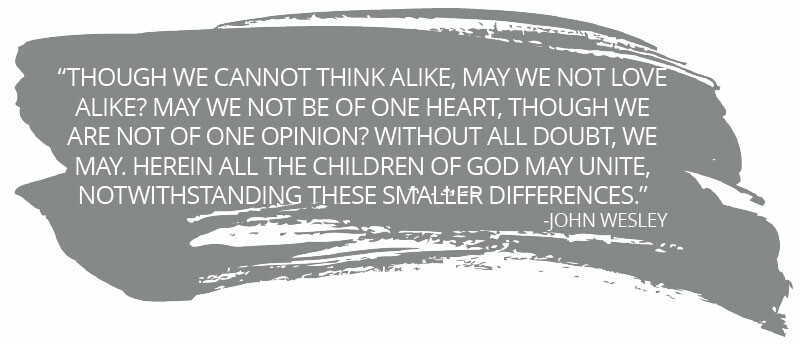
IN SONG
They’ll Know We Are Christians by Our Love, TFWS #2223
Bind Us Together, TFWS #2226
Changed by Tremaine Hawkins
Worth by Anthony Brown
IN REFLECTION AND ACTION
- Look around your faith community. How well does it reflect the diversity of society around you? How segregated or integrated is your church and what efforts have you/will you take to “not be silent”?
- What does it mean for you, personally, to be “United to Love.” What do you believe it means for your church? For the Baltimore-Washington Conference and The United Methodist Church?
- Go Deeper: COVENANT — Pledge to God in prayer your commitment to allow God to use your transformed life to transform
lives of others by praying this contemporary version of the Covenant Prayer in the Wesleyan Tradition:
I am no longer my own, but yours.
Put me to what you
Put me to doing, put me to suffering.
Let me be put to work for you or set aside for you,
Praised for you or criticized for you.
Let me be full, let me be empty.
Let me have all things, let me have nothing.
I freely and fully surrender all things to your glory and service.
And now, O wonderful and holy God, Creator, Redeemer, and Sustainer, you are mine, and I am yours.
So be it.
And the covenant which I have made on earth,
Let it also be made in heaven.
Amen.
Find at least one way this week to live out this covenant in relevant ways to intentionally give life, create, restore, heal, break chains, encourage, empower, welcome, and/or practice unity. Share your intention with your group or one other person. Hold each other accountable, united to love.
IN PRAYER
God, Give me a clean heart that I might serve you.
Give me a transformed mindset that I might witness for you.
Give me the courage to own my whole story and to join it with yours
Because you created me to love as Christ loves,
So that
